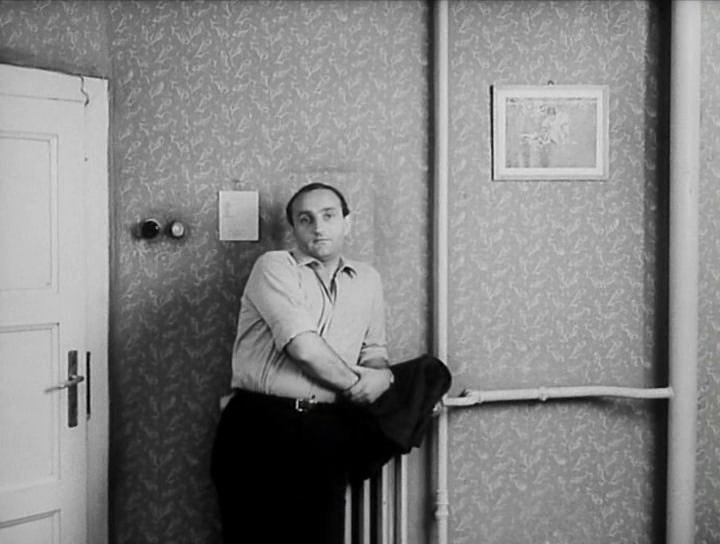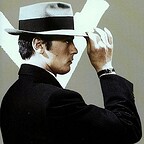The Joke (Zert, 1969) is a Czechoslovakian drama directed by Jaromil Jires. The film was awarded with OCIC Award at San Sebastian International Film Festival in 1969.
As a consequence of a politically incorrect letter to his girlfriend, Ludvik Jahn (Josef Somr) is expelled from Communist Party, the University, ostracised by his best friends and assigned to six years in a brainwashing camp intended to reform anti-communistic individuals. Years later, he encounters Helena Zemánková (Jana Dítetová) who apart from being a journalist, turns out to be the wife of his former crony from student years Pavel Zemánek (Ludek Munzar) who was one of the people responsible for his exile. Ludvik chooses to savour the long-craved vengeance…

“Its solid subject matter and political intractability frequently make amends for the lack of prepossessing décor”
The Joke is an enjoyable Czechoslovakian drama abounding with intelligence and directional astuteness. Possibly as a mordant nuance to social realism and glorification of allegedly universal communistic virtues, the motion picture is commenced with a scene portraying two clockwork blacksmiths at work as well as other miniature figures embodying members of miscellaneous social classes. Successively, the movie proceeds to another deft sequence which exhibits the main character interviewed by amiable, but naïve Helena coveting to get to know his view on some recent decisions undertaken by government in his research institute. Whereas he is conversing with Helena, the camera displays Ludvik tentatively walking on a narrow plank. Not only does the instant most adroitly capture the ephemerality of one’s social position in communistic system, but also circumspectly augurs the central theme of the piece and attests what direction the flick will follow. The short narrative gesture constitutes an exceedingly acute hook for the remainder of the film and saliently outlines the anti-regime topic. The director Jaromil Jires precisely knows what he is after and from the very onset, each second is prudently calculated with admirable delicacy. Employing the non-linear storytelling and inconspicuous moral boundaries, the ensemble impresses in its profuse depiction of relationships in which politics play a significant role.

Despite the swift pacing, the movie never feels precipitate or anyhow incomplete in its endeavours to muckrake the hypocrisy of malfunctioning system and draft the sightlessness of obtusely fervent communists incapable of carrying out any constructive concepts and transcending their rigid sense of morality. The Joke unfurls in a remarkably proficient manner and alludes to more issues than its running time might suggest, yet it is owing to its inherently derisive tone that The Joke yields its story auspiciously insofar as it becomes a genuinely riveting experience, even if it is at a loss for its primordial stimulus towards the denouement. Jires forgoes the pitfall of mendacious martyrdom and even if he does not trivialise the dereliction, which the protagonist incurs upon writing the politically illicit letter to his staunch communistic girlfriend, he invariably reduces majority of murkiness the tale may elicit through employing flashbacks and distancing the occurrences which took place in Ludvik’s youth. As an epiphenomenon, the material incessantly appears refreshing and bleakly humorous. Initially, one sympathises with unwarrantedly rejected Ludvik who didn’t relinquish communism and meant the letter as a mere joke. Notwithstanding, the further the flick ensues, the lesser one identifies themselves with Ludvik who doesn’t make any allowances for entirely innocent Helena. Ultimately, he becomes just like the people that renounced him – he loses his soul and grows as hypocritical and cold as Pavel Zemánek whom he yearns to devastate.

Josef Somr is a tremendous choice for the role of vengeful Ludvik Jahn. He resplendently amalgamates insouciance and sardonicism in his quite demanding part. His acting skills particularly shimmer in the scene during which he lays with Helena Zemánková on a bed and jadedly listens to the story pertaining to her first meeting with her consort. Jana Dítetová likewise gratifies with her performance as Helena, whilst Ludek Munzar impersonating Pavel Zemánek rather stays in the background.

The cinematography by Jan Curík might not be smashingly outstanding, but perpetually remains sufficient for the film’s purposes. Curík’s camerawork chicly encompasses the objects and characters encircling the protagonist and albeit slightly nondescript, it doesn’t prostrate the movie in any big measure forasmuch as the venture generally relies on the power of its defiance rather than visual imagery. The soundtrack by Zdenek Pololáník is rather sparing, for most of the neat music existent in the creation comprises of provincial tracks as well as sundry songs e.g. Kalinka.

Although The Joke does not constitute a particularly bliss-inducing watch, its solid subject matter and political intractability frequently make amends for the lack of prepossessing décor which could perhaps dilute the effort’s realism, but concomitantly enhance one’s enjoyment even more. Still, on account of enough substance and the convenient length, I firmly believe that this darkly amusing and original work is an insightful and worthwhile way of spending roughly 80 minutes of your life.
Verdict: 7/10 stars – very good






